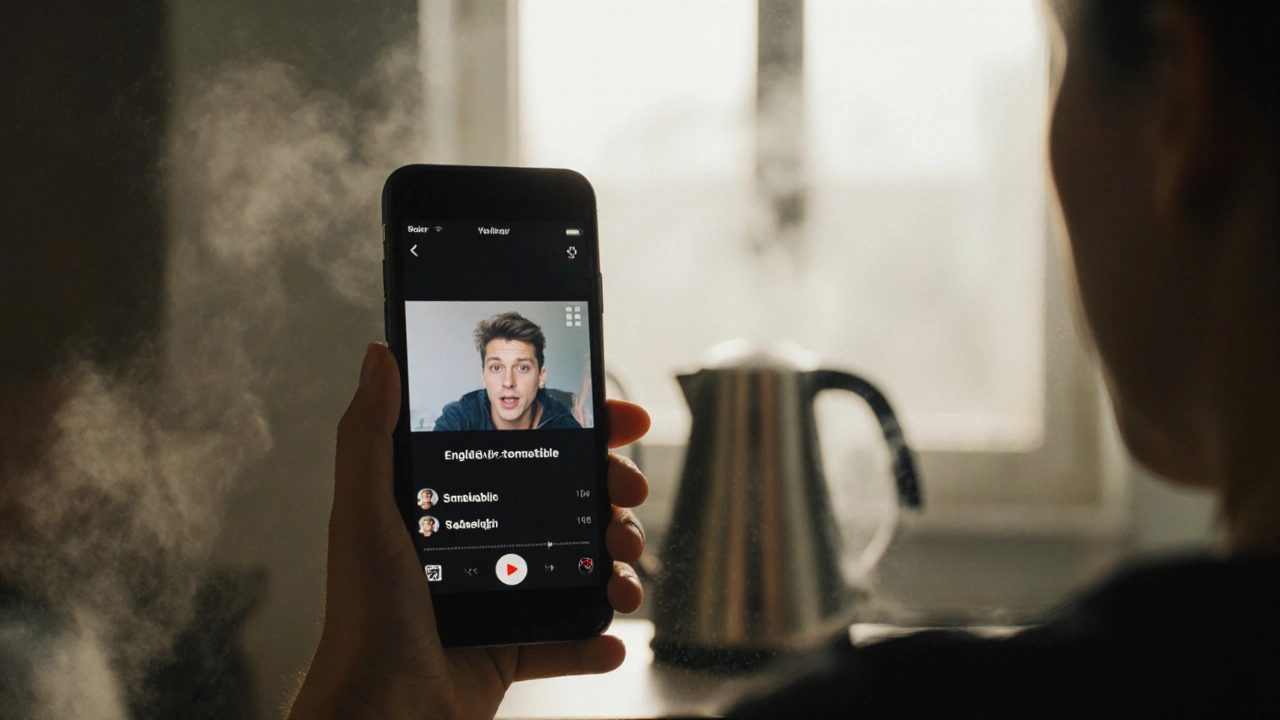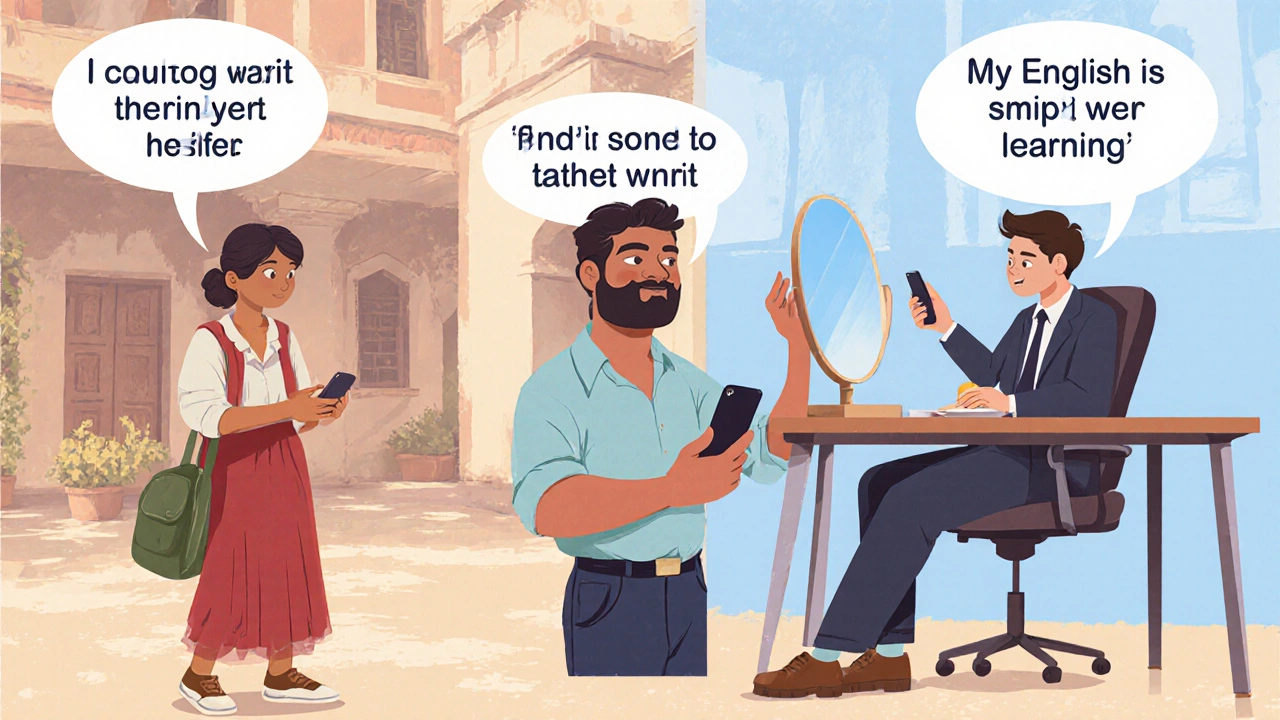Fluency Confidence Calculator
How long will it take to speak English confidently? This tool estimates your fluency timeline based on your daily practice habits.
Your Practice Habits
Confidence Boosters
Want to speak English without hesitation, without fear of making mistakes, without that nervous pause before every sentence? You’re not alone. Millions of non-native speakers around the world - including students in Bangalore, professionals in Delhi, and factory workers in Chennai - want the same thing. And the truth? Fluency isn’t about perfect grammar. It’s about being understood. It’s about speaking without waiting for permission to speak.
Stop memorizing, start using
Most English learners spend years memorizing vocabulary lists and grammar rules. Then they freeze when someone asks them a simple question like, "What did you do this weekend?" Why? Because memorization doesn’t build muscle. Speaking does.Think of your brain like a muscle. You wouldn’t learn to swim by reading a book about water. You’d jump in. Same with English. The best way to speak fluently is to use it - even if you mess up. Start small. Talk to yourself in the mirror. Describe what you’re doing: "I’m making tea. The water is boiling. I added two spoons of sugar." It sounds silly, but it trains your mouth and brain to work together in real time.
Don’t wait until you’re "ready." You’ll never feel ready. The moment you start speaking, even badly, you begin to improve. Every mistake is data. Every pause is a signal. Your brain learns faster from real use than from perfect textbook examples.
Listen like you’re learning a song
You didn’t learn your first language by studying grammar. You listened. You copied. You repeated sounds until they felt natural. That’s how you learn English too.Find short audio clips - 30 to 90 seconds - of native speakers talking. Use YouTube, podcasts, or even TikTok. Listen once just to get the feeling. Listen again and try to repeat what they say out loud, word for word. Don’t worry about understanding every word. Focus on rhythm, stress, and how words connect.
For example, instead of saying "I want to go," native speakers often say "I wanna go." Instead of "What are you doing?" they say "Whatcha doin’?" These aren’t mistakes - they’re how real people talk. If you want to sound natural, you need to learn these patterns.
Try this daily: Pick one short clip. Listen 3 times. Repeat it 5 times. Then record yourself. Compare. You’ll hear your progress in just a week.
Speak with real people - not just textbooks
Textbooks teach you how to say "I would like to order a coffee." Real life doesn’t work like that. People say: "Can I get a latte?" or "Coffee, please. Black."Find someone to talk to. It doesn’t have to be a native speaker. Find a friend who’s also learning. Meet once a week. Set a topic: "Talk about your favorite movie," or "Describe your last vacation." Give each other feedback. No corrections during the conversation - just after. Say: "I didn’t understand your word for ‘boring’ - what did you say?" That’s how real learning happens.
If you can’t find a partner, use free apps like Tandem or HelloTalk. You can chat by voice or video. You help someone with Hindi or Tamil. They help you with English. No pressure. No grades. Just practice.

Build your own phrases - don’t translate
When you think in your native language and translate word-for-word, you sound stiff. You say: "I am having hunger." But native speakers say: "I’m hungry."Stop translating. Start collecting phrases. Write down real sentences you hear or read. Save them. Use them. For example:
- "I’m not sure, but I think..."
- "That’s a good point, but..."
- "Could you repeat that slowly?"
- "I didn’t catch that."
These aren’t grammar rules. They’re tools. Keep a notebook. Every time you hear a useful phrase, write it down. Practice saying it out loud. Soon, you’ll start using them without thinking.
Accept mistakes - they’re part of the process
Fear of mistakes is the biggest blocker to fluency. You think: "If I say it wrong, they’ll laugh." But here’s the truth: Most people don’t notice your mistakes. They’re too busy thinking about what they’ll say next.When you make a mistake, don’t stop. Keep going. Say: "Sorry, let me rephrase." Or just laugh and say: "My English is still learning!" People respond to confidence, not perfection.
Try this: Every time you speak, give yourself one "mistake pass." Let yourself say something wrong. No shame. No apology. Just move on. After 10 days, you’ll notice something surprising - you’re speaking faster. And you’re not afraid anymore.
Practice daily - even for 10 minutes
Fluency doesn’t come from weekly classes. It comes from daily habits. You don’t need an hour. You need 10 minutes.Here’s a simple daily routine:
- Listen to a 1-minute English clip (podcast, video, song).
- Repeat it out loud 3 times.
- Record yourself saying one thing about your day.
- Listen back. Note one thing you did well. One thing to improve.
Do this every day for 30 days. You’ll be amazed at how much more natural you sound. Your brain starts thinking in English - not translating.

Surround yourself with English - without pressure
Change your phone’s language to English. Watch Netflix with English subtitles (not your native language). Read headlines on BBC or CNN. Don’t try to understand everything. Just get used to the sound.Put English in places you already spend time. Your bathroom mirror? Stick a note: "What’s one thing you’re proud of today?" Your commute? Listen to an English podcast. Your lunch break? Read a short article.
You don’t need to study. You need to absorb.
What stops most people? And how to fix it
Most people give up because they compare themselves to native speakers. They hear someone speak smoothly and think: "I’ll never sound like that." But here’s what you don’t see: That person practiced for years. They made thousands of mistakes. They were embarrassed. They felt stupid. They kept going anyway.Fluency isn’t about sounding like a native. It’s about being clear, calm, and confident. You don’t need to lose your accent. You just need to be understood.
Focus on these three things:
- Speak slowly enough to be clear
- Use simple words you know
- Smile. Relax. Breathe.
That’s all it takes to sound confident.
How long does it take to speak English fluently?
There’s no fixed timeline. It depends on how much you practice, not how many classes you take. Someone who speaks 10 minutes a day, every day, will improve faster than someone who studies for 2 hours once a week. Most people notice real progress in 3 to 6 months with daily practice. Fluency isn’t a destination - it’s a habit.
Do I need to take a course to speak English well?
No. Courses can help, but they’re not necessary. Many people become fluent without ever taking a class. What matters is consistent practice: listening, repeating, speaking, and correcting yourself. A course gives structure, but you build fluency through real use - not lectures.
Why do I understand English but can’t speak it?
You’ve trained your ear, not your mouth. Listening is passive. Speaking is active. Your brain knows the words, but your tongue hasn’t learned how to form them quickly. The fix? Talk out loud every day - even if it’s just to yourself. Practice speaking before you worry about grammar. Speed comes with repetition.
Should I focus on accent or clarity?
Focus on clarity. A strong accent doesn’t stop people from understanding you - unclear pronunciation does. Work on stressing the right syllables, linking words, and speaking at a steady pace. Your accent is part of your identity. Don’t try to lose it. Just make sure your message gets through.
What if I don’t have anyone to practice with?
You don’t need another person. Talk to your phone. Record yourself answering questions like "What did you eat today?" or "What’s your favorite season?" Play it back. Notice where you hesitate. Repeat those parts. Use free apps like ELSA Speak or Speechling for instant feedback. Practice is practice - even if you’re alone.
Next steps: Start today
You don’t need to wait for the perfect time. You don’t need to buy a course. You don’t need to be perfect.Right now, open your phone. Record yourself saying: "My name is [your name]. I’m learning to speak English. I’m not perfect. But I’m getting better every day."
Then play it back. Smile. You just took your first real step.
